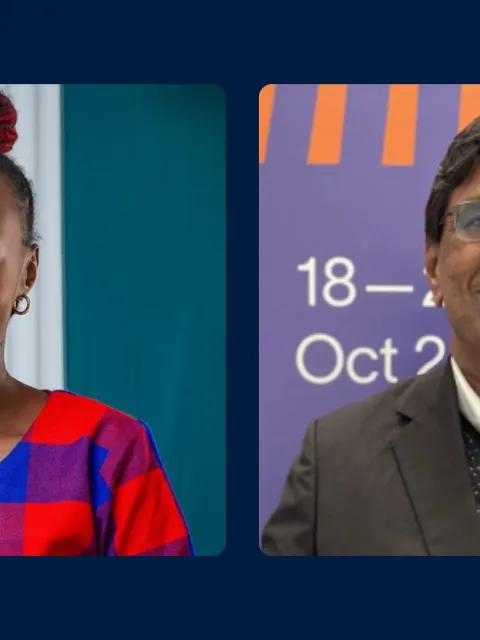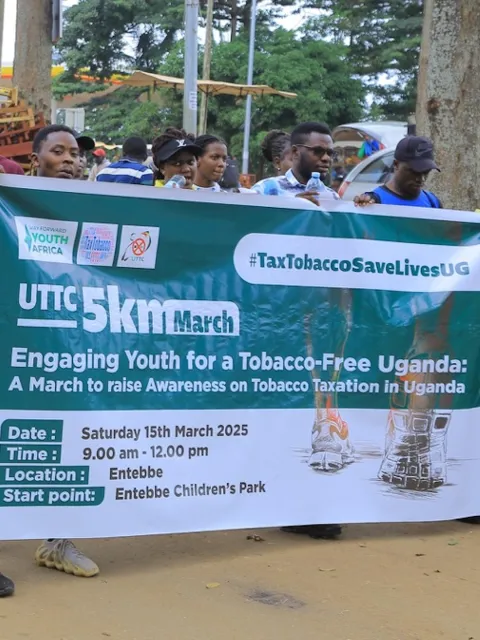Global tobacco control frameworks, local action, and civil society recognition by WHO
Ahead of World No Tobacco Day, UICC speaks with the Head of the WHO FCTC and the Chairperson of the Cancer Society of the Maldives about how stronger tobacco control measures and civil society leadership are crucial to tackling preventable cancer deaths, and recognises WHO's 2025 World No Tobacco Day award recipients.

HIGHLIGHTS
-
Adriana Blanco Marquizo, Head of the Secretariat of the WHO FCTC highlights uneven progress in adopting effective measures like taxation and smoke-free laws, despite their proven impact on reducing tobacco-related deaths.
-
Industry interference continues to threaten public health policies, underscoring the need for strong enforcement of WHO FCTC guidelines and civil society vigilance.
-
Juwairiya Saeed, Chairperson of Cancer Society of the Maldives, a UICC member, describes advocacy efforts behind the country’s generational tobacco ban, to be implemented from late 2025.
-
WNTD Awards 2024 recognised Dr Murallitharan Munisamy (Malaysia) and Elvina Majiwa (Kenya), both connected to UICC, for uniting stakeholders and amplifying youth voices in tobacco control.
Tobacco use remains one of the most significant preventable causes of cancer, contributing to millions of deaths each year. It is responsible for approximately one in five cancer deaths globally, including approximately 85% of all lung cancer cases, and with strong links to throat, mouth, pancreatic, and bladder cancers, among others.
To better understand both global frameworks and country-level efforts in tobacco control in the lead-up to World No Tobacco Day, UICC spoke with Adriana Blanco Marquizo, Head of the Secretariat of the WHO Framework Convention on Tobacco Control (WHO FCTC), and Juwairiya Saeed, Chairperson of Cancer Society of the Maldives, a UICC member. Their perspectives shed light on successes, setbacks, and the practical realities of advancing tobacco control in different contexts.
According to the World Health Organization (WHO), smoking prevalence has declined globally over recent decades, largely due to the implementation of comprehensive tobacco control measures. However, progress varies across regions and countries, influenced by factors such as policy adoption, industry interference, and the emergence of new nicotine products.
“We have seen notable successes where countries have implemented the measures in the MPOWER package, which WHO developed to support countries in fulfilling the obligations of the FCTC,” said Blanco Marquizo. “These include monitoring use, protecting people from smoke, offering help to quit, warning about dangers, enforcing bans on advertising, and raising taxes. South America, for example, now has entirely smoke-free environments.”
Yet, she added, many of the countries who are parties to the WHO FCTC have yet to fully apply these tools. Among the most effective – and underused – measures is taxation: increasing tobacco prices by 10% can cut consumption by 4-5%. “It's not just about having a tax,” said Blanco Marquizo. “The tax must make tobacco products less affordable. If it doesn't impact affordability, it won't reduce use."
Blanco Marquizo also highlighted the effectiveness of coordinated implementation, noting that widespread health warnings and smoke-free environments have become increasingly common. She added, however, that: “Only about half of the parties have adopted packaging measures such as graphic warnings, and just a third have comprehensive smoke-free laws. Uneven progress is a recurring concern.”
Persistent interference by the tobacco industry remains one of the major obstacles to advancing these policies. She underscored the importance of implementing Article 5.3 of the FCTC, which requires governments to shield public health policy from tobacco industry interests, but which is often weakly enforced.
“The tobacco industry adapts. They always have new strategies. It takes political will to push back – and civil society plays a crucial role in holding governments accountable.”
– Adriana Blanco Marquizo, Head of the Secretariat of the WHO Framework Convention on Tobacco Control
At the national level, the Cancer Society of the Maldives provides a clear example of civil society's role in prevention efforts.
The organisation has led community-based efforts to promote cancer awareness and screening across the Maldives’ 20 atolls, where geographic dispersion poses serious challenges. Saeed’s team runs mobile awareness campaigns and screenings, often reaching six or seven islands per trip. Since 2014, the society has expanded to cover five cancer types, with activities supported by volunteers and local doctors.
Their advocacy has helped shape policy beyond prevention. Government initiatives now offer comprehensive coverage for cancer treatment in public hospitals, and support for travel and care abroad. Time off for treatment is now formally recognised for workers.
That advocacy has now led to a major milestone: in May 2025, the People’s Majlis, the unicameral legislative body of Maldives, passed an amendment to the tobacco control bill enacting a generational tobacco ban. The President of the Maldives ratified the amendment, which will prohibit the sale of tobacco to anyone born on or after 1 January 2007, beginning in November 2025.
“This step towards generation tobacco ban is a major achievement for the Maldives. We hope the implementation and enforcement will be done smoothly.”
– Juwairiya Saeed, Chairperson of Cancer Society of the Maldives
Saeed points, however, to the increasing visibility and marketing of emerging tobacco and nicotine products, such as e-cigarettes and heated tobacco products, often aimed at youth. “We need stronger regulation,” she says, pointing to other countries, such as India, which have banned e-cigarettes and vapes.
This is a growing concern globally. Blanco Marquizo stressed that new nicotine products are often introduced under the guise of so-called ‘harm reduction' for adult smokers, but in fact they are marketed in ways that appeal to young people. “They come in attractive flavours and designs, promoted on social media, often by influencers.”
Blanco Marquizo noted that while the Convention primarily covers tobacco products, decisions from its government body call on countries to take a proactive stance in regulating or banning new nicotine products to prevent future harm. She notably called for applying the guidelines and tools supported by the FCTC, particularly bans on flavours, plain packaging, and advertising restrictions.
Civil society engagement, political commitment, and cross-sector collaboration remain key. In this context, World No Tobacco Day underscores to need to unmask the tobacco industry's manipulative tactics, resist its influence over public health policy, and sustain momentum behind comprehensive tobacco control. “The tools exist. The challenge is making full use of them – without delay,” said Adriana Blanco Marquizo.
The upcoming Conference of the Parties to the WHO FCTC in November 2025 will see renewed efforts and opportunities to advance implementation of the treaty. As an NGO observer, UICC will support the work of the Secretariat by engaging its members to help promote and strengthen tobacco control measures.

The Tobacco Control room is a dedicated space for professionals, researchers, activists, and advocates who are passionate about combating tobacco products use and its harmful effects.
UICC affiliates honoured with World No Tobacco Day Awards for leadership in tobacco control
Two civil society leaders affiliated with UICC have been honoured with the World No Tobacco Day Award 2024 for their exceptional contributions to advancing tobacco control across Africa and Asia.
In Malaysia, Dr Murallitharan Munisamy, a UICC Young Leader 2019–2020 and Managing Director of the National Cancer Society of Malaysia, a UICC member organisation, was recognised for his pivotal role in uniting government, political, and civil society stakeholders to pass Malaysia’s first standalone tobacco control law, the Control of Smoking Products for Public Health Act 2024.
Elvina Majiwa, Executive Director of Health Conscious Africa, and a member of the Kenya Tobacco and Nicotine Tax Coalition – established through a joint initiative between UICC and Cancer Research UK (CRUK) – has led effective youth-centred advocacy in Kenya through community mentoring, digital advocacy, and direct engagement with policymakers.
Learn more about these two recipients of the 2025 World No Tobacco Day Awards
Last update
Wednesday 28 May 2025
